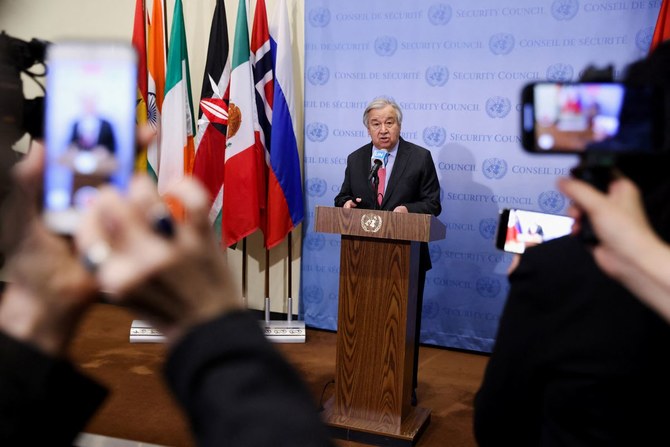NEW YORK: UN Secretary-General Antonio Guterres said on Monday that he has asked the organization’s humanitarian chief, Martin Griffiths, “immediately to explore with the parties involved” the possibility of a humanitarian truce in Ukraine.
He said that Griffiths will begin his efforts in pursuit of a ceasefire straight away and has already initiated some contacts.
“I hope that (he) will be able to go to both Moscow and Kyiv as soon as that becomes possible,” said Guterres. “It’s very important to establish a serious dialogue with both parties in relation to the possibility of this humanitarian ceasefire.”
He added: “A cessation of hostilities will allow essential humanitarian aid to be delivered and enable civilians to move around safely. It will save lives, prevent suffering and protect civilians.”
He also called for the ceasefire “to allow for progress in serious political negotiations aimed at reaching a peace agreement based on the principles of the United Nations Charter.
Guterres said he has been in close contact with authorities in a number of countries who have been exploring potential options for mediation with the warring parties that could pave the way to a political solution, including Turkey, Qatar, Israel, India, China, France and Germany.
He added that he hopes a ceasefire will also help to tackle the wider global consequences of the war in Ukraine “which risk compounding the deep hunger crisis in many developing countries that already lack fiscal space to invest in their recovery from the pandemic, and now face soaring food and energy costs.”
The UN chief lamented the “senseless loss of thousands of lives” since the war began on Feb. 24, along with “the displacement of 10 million people, mainly women and children, the systematic destruction of essential infrastructure, and skyrocketing food and energy prices worldwide.”
He said: “This must stop. The solution to this humanitarian tragedy is not humanitarian. It is political.”
In response to fears that the conflict could escalate into a biological or nuclear war, Guterres said the International Atomic Energy Agency will announce a number of “very important initiatives” soon “to guarantee the security of the nuclear facilities inside Ukraine.”
He added: “On the other hand, I can’t imagine the possibility of having a nuclear, a biological or a chemical war in this scenario. That will be something that I think will be avoided. It must be avoided.”




























